Compliance and Regulation Law bilingual Dictionnary

The market is normally self-regulated. It suffers from one-time failures when economic agents engage in anti-competitive behavior, mainly the abuse of dominant positions in the ordinary markets, or the abuse of markets in the financial markets, sanctioned ex post by the authorities in individual decisions.
But some sectors suffer from structural failures, which prevent them, even without malicious intent of agents, from reaching this mechanism of adjustment of supply and demand. The existence of an economically natural monopoly, for example a transport network, constitutes a structural failure. Another agent will not duplicate once the first network has been built, which prevents competition. An a-competitive regulation, either by nationalization, by a state control or by a control by a regulatory authority, is needed to ensure everyone's access to an essential facility. Also constitutes a market failure asymmetry of information, theorized through the notion of agency that hinders the availability and circulation of exhaustive and reliable information on markets, especially financial markets. This market failure carries with it a systemic risk, against which regulation is definitely built and entrusted to financial regulators and central banks.
In these cases, the implementation of regulations is a reaction of the State not so much by political rejection of the Market, but because the competitive economy is unfit to function. This has nothing to do with the hypothesis that the State is distancing itself from the Market, not because it is structurally flawed in relation to its own model, but because politics wants to impose higher values, expressed By the public service, whose market does not always satisfy the missions.
Thesaurus : Doctrine

► Full Reference: J.-B. Racine, "Obligation de Compliance et droits humains" ("Compliance Obligation and Human Rights"), in M.-A. Frison-Roche (dir.), L'Obligation de Compliance, Journal of Regulation & Compliance (JoRC) and Dalloz, "Régulations & Compliance" Serie, 2024, to be published.
____
📕read a general presentation of the book, L'Obligation de Compliance, in which this article is published
____
► English Summary of the article (done by the Journal of Regulation & Compliance - JoRC) : The author asks whether human rights can, over and above the many compliance obligations, form the basis of the Compliance Obligation. The consideration of human rights corresponds to the fundamentalisation of Law, crossing both Private and Public Law, and are considered by some as the matrix of many legal mechanisms, including international ones. They prescribe values that can thus be disseminated.
Human rights come into direct contact with Compliance Law as soon as Compliance Law is defined as "the internalisation in certain operators of the obligation to structure themselves in order to achieve goals which are not natural to them, goals which are set by public authorities responsible for the future of social groups, goals which these companies must willingly or by force aim to achieve, simply because they are in a position to achieve them". These "Monumental Goals" converge on human beings, and therefore the protection of their rights by companies.
In a globalised context, the State can either act through mandatory regulations, or do nothing, or force companies to act through Compliance Law. For this to be effective, tools are needed to enable 'crucial' operators to take responsibility ex ante, as illustrated in particular by the French law on the Vigilance Obligation of 2017.
This obligation takes the form of both a "legal obligation", expression which is quite imprecise, found for example in the duty of vigilance of the French 2017 law, and in a more technical sense through an obligation that the company establishes, in particular through contracts.
Legal obligations are justified by the fact that the protection of human rights is primarily the responsibility of States, particularly in the international arena. Even if it is only a question of Soft Law, non-binding Law, this tendency can be found in the Ruggie principles, which go beyond the obligation of States not to violate human rights, to a positive obligation to protect them effectively. The question of whether this could apply not only to States but also to companies is hotly debated. If we look at the ICSID Urbaser v. Argentina award of 2016, the arbitrators accepted that a company had an obligation not to violate human rights, but rejected an obligation to protect them effectively. In European Law, the GDPR, DSA and AIA, and in France the so-called Vigilance law, use Compliance Lools, often Compliance by Design, to protect human rights ex ante.
Contracts, particularly through the inclusion of multiple clauses in often international contracts, express the "privatisation" of human rights. Care should be taken to ensure that appropriate sanctions are associated with them and that they do not give rise to situations of contractual imbalance. The relationship of obligation in tort makes it necessary to articulate the Ex Ante logic and the Ex Post logic and to conceive what the judge can order.
The author concludes that "la compliance oblige à remodeler les catégories classiques du droit dans l’optique de les adosser à l’objectif même de la compliance : non pas uniquement un droit tourné vers le passé, mais un droit ancré dans les enjeux du futur ; non pas un droit émanant exclusivement de la contrainte publique, mais un droit s’appuyant sur de la normativité privée ; non pas un droit strictement territorialisé, mais un droit appréhendant l’espace transnational" ("Compliance requires us to reshape the classic categories of Law with a view to bringing them into line with the very objective of Compliance: not just a Law turned towards the past, but a Law anchored in the challenges of the future; not a Law emanating exclusively from public constraint, but a Law based on private normativity; not a strictly territorialised Law, but a law apprehending the transnational space".
________
Thesaurus : Doctrine
Publications
► Full Reference: Frison-Roche, M.-A, Compliance Law, the new legal way for Human Values : towards an Ex Ante Responsabily, in Mélanges Arnoldo Wald, A evoluçao do direito no século XXI, vol.2, 2022, p. 971-984.
The first volume has been published in 2007.
_____
🚧read the Working Paper, written in English with complementary developments, technical references and hypertext links, on which this article is based.
Compliance and Regulation Law bilingual Dictionnary

The liberal professions such as lawyers, doctors or accountants are organized into professional bodies and consider that they can not be reduced to mere companies operating in markets because the service they offer includes a human and moral dimension, translated by ethics, under the supervision of their internal professional organization, particularly through ex ante their power to adopt their own standards of behavior, and in ex post, the disciplinary power of their professional order.
Competition law refutes this organization from the Old Regime and simply considers the "markets of legal or medical services, firms having to compete with each other and not having to organize the sector, by or fixing Numerus clausus, etc.
In the perspective of regulation, the liberal professions are, on the contrary, the ones most pertinento organize self-regulation in a globalized economy from the moment they give rise to a credible surveillance system and thus deserve the confidence of customers and public regulators.
Publications

🌐follow Marie-Anne Frison-Roche sur LinkedIn
🌐subscribe to the Newsletter MAFR Regulation, Compliance, Law
____
► Full Reference: M.-A. Frison-Roche, "Le droit processuel, prototype de l'Obligation de Compliance" (General Procedural Law, prototype of Compliance Obligation), in M.-A. Frison-Roche (dir.), L'obligation de Compliance, Journal of Regulation & Compliance (JoRC) and Dalloz, coll. "Régulations & Compliance", 2024, forthcoming.
____
📝read the article (in French)
____
🚧read the bilingual Working Paper on which this article was based, with additional developments, technical references and hyperlinks
____
📕read the general presentation of the book, L'obligation de Compliance, in which this article is published
____
► English Summary of this article: A number of ideas are beginning to emerge to describe the relationship that needs to be built up between General Procedural Law and Compliance Obligation, if only to take account of the emerging litigation in the field of Compliance Law.
At first sight, however, it would appear that Compliance Law does not give rise to any procedural obligation, since Compliance is designed to develop ex ante, in order to avoid the courts. Compliance by design should perfect this aim, the presence of any jurisdictional proceedings being a failure in itself and because of the delays and uncertainties that are associated with them by nature.
If we accept the presence of judges, lawyers and procedural rights and obligations, in particular the right of action and the rights of defence, for many it would be only in order to respect the Rule of Law, a tribute that must be paid, a dose of inefficiency within efficiency, thus pitting the disciplines against each other, in this case Law on the one hand and Economics and Management on the other. More often than not, we leave it at that, either to admit it and strike a balance, or to regret it and wait to see which logic will prevail, between procedural rights and obligations on the one hand and compliance rights and obligations on the other...
On the contrary, we must reject this logic of communicating vessels.
In fact, Compliance Law is an extension of Regulatory Law, which it extends beyond sectors and borders, and whose normativity is anchored in the Compliance Monumental Goals set by political and public Authorities, which aim to ensure that in the future systems do not collapse, or even improve so that the human beings who depend on them are not crushed by them but, on the contrary, benefit from them.
This gives rise to "systemic compliance litigation", which gives rise to specific procedural principles. First of all, it is important to clarify what a "systemic case" is, a concept that I proposed in 2021, and to which the cases that are now being brought before the courts correspond. The specific nature of these emerging systemic compliance disputes, which are objective disputes, similar to administrative disputes, which fully justifies the presence of the public prosecutor and raises the question of whether there would be a 'natural judge' for these systemic compliance disputes, have major procedural consequences, particularly on procedural rights and obligations: in particular the right to be a party to the proceedings, even if you are a party to the dispute, which is the case for the stakeholders.
The result is a new alliance between the Compliance Obligation and General Procedural Law, which gives rise to compliance obligations of a procedural nature within Compliance Law itself. It is no longer necessary to divide Ex Ante and Ex Post, but to borrow compliance principles and insert them into jurisdictional procedures, as envisaged by the Haut Conseiller François Ancel (moving from Ex Ante to Ex Post), while it is necessary to insert procedural principles into compliance obligations within companies (moving from Ex Post to Ex Ante), as shown in the book Compliance Jurisdictionalisation. This is particularly illustrated in relation to the Obligation of Vigilance, which is the spearhead of the Compliance Obligation.
This is particularly relevant in relation to three procedural obligations which must now structure the compliance obligations in the behaviour of the companies and parties concerned, even independently of any jurisdictional proceedings, since the court may be called upon to verify their fulfillment on both sides and to promote them, which gives him/her an ex ante role: the obligation to discuss (adversarial principle), the obligation to provide information (evidentiary system) and the obligation to demonstrate (principle of the motivation).
This alliance thus changes both Compliance Law and Procedural Law, since it changes the role of the judge. But this question of the judge's office is the subject of a separate contribution for this book.
________
April 4, 2024
Publications
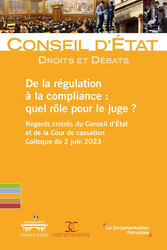
🌐follow Marie-Anne Frison-Roche on LinkedIn
🌐subscribe to the Newsletter MAFR Regulation, Compliance, Law
____
► Full Reference: M.-A. Frison-Roche, "Le rôle du juge dans le déploiement du droit de la régulation par le droit de la compliance" ("Synthesis: The role of the Judge in the deployment of Regulatory Law through Compliance Law"), Synthesis in Conseil d'État (French Council of State) and Cour de cassation (French Court of cassation), De la régulation à la compliance : quel rôle pour le juge ? Regards croisés du Conseil d'Etat et de la Cour de cassation - Colloque du 2 juin 2023, La Documentation française, "Droits et Débats" Serie, 2024, pp.
____
____
🚧read the bilingual Working Paper which is the basis of this article, with additional developments, technical references and hyperlinks
____
► Presentation of this concluding article: It is remarkable to note the unity of conception and practice between professionals who tend to work in administrative jurisdictions and professionals who tend to work in judicial jurisdictions: they all note, in similar terms, an essential movement: what Regulatory Law is, how it has been transformed into Compliance Law, and how in one and even more so in the other the Judge is at the centre of it.
Judges, as well as Regulators and European officials, explain this and use different examples to illustrate the far-reaching changes it brings to the Law and to the companies responsible for increasing the systemic effectiveness of the rules through the practice and dissemination of a Culture of Compliance.
The role of the judge participating in this Ex Ante transformation is renewed, whether he/she is a judge of Public Law or a judge of Private Law, in a greater unity of the legal system.
____
► English Summary of this article: The tug-of-war between 'Compliance' and 'conformity', which is exhausting us, obscures what is essential, i.e. the great novelty of a branch of law that assumes a humanist vision expressing the ambition to shape the future so that it is not catastrophic (preventing systems from collapsing), or even better (protecting human beings in these systems).
The article begins by describing the emergence of Compliance Law, as an extension of Regulatory Law and going beyond it. This new branch of law takes account of our new world, brings its benefits and seeks to counter these systemic dangers so that human beings could be their beneficiaries and are not crushed by them. This branch of Ex Ante Law is therefore political, often supported by public Authorities, such as Regulatory Authorities, but today it goes beyond sectors, as shown by its cutting edge, the Obligation of Vigilance.
The "Monumental Goals" in which Compliance Law is normatively anchored imply a teleological interpretation, leading to an "empowerment" of the crucial operators, not only States but also companies, responsible for the effectiveness of the many new Compliance Tools.
The article goes on to show that Judges are increasingly central to Compliance Law. Lawsuits are designed to make companies more accountable. In this transformation, the role of the judge is also to remain the guardian of the Rule of Law, both in the protection of the rights of the defence and in the protection of secrets. Efficiency is not what defines Compliance, which should not be reduced to a pure and simple method of efficiency, which would lead to being an instrument of dictatorship. This is why the principle of Proportionality is essential in the judge's review of the requirements arising from this so powerful branch of Law.
The courts are thus faced with a new type of dispute, of a systemic nature, in their own area, which must not be distorted: the Area of Justice.
____
📝read article (in French)
________

March 28, 2024
Publications

🌐suivre Marie-Anne Frison-Roche sur LinkedIn
🌐s'abonner à la Newsletter MAFR Regulation, Compliance, Law
____
 ► Référence complète : M.-A. Frison-Roche, L'émergence du Contentieux Systémique, document de travail, mars 2024.
► Référence complète : M.-A. Frison-Roche, L'émergence du Contentieux Systémique, document de travail, mars 2024.
____
🎤 Ce document de travail a été élaboré pour servir de base à la 1ière intervention, relative à "L'émergence du Contentieux Systémique", dans la conférence-débat sur Importance et spécificité du Contentieux Systémique Émergent , qui s'est tenue à la Cour d'appel de Paris le 29 mars 2024.
____
📝Il est aussi la base de l'article qui s'en suivra.
____
► Résumé du document de travail : Nous voyons émerger ce qu'il convient d'émerger un "Contentieux Systémique". Cette notion, proposée en 2021, vise l'hypothèse dans laquelle un système est "impliqué" dans une "cause" particulière soumise au juge. Il ne faut confondre présence d'un système et analyse systémique d'un phénomène. Le terme de "cause" doit être entendu au sens procédurale, tel que l'article 5 du Code civil l'utilise. Précisément, la prohibition portée par l'article 5 du Code civil ne s'applique pas parce qu'un système ainsi impliqué appelle des réponses et des solutions de fait et non pas nécessairement des solutions générales et abstraites : la solution de nature et de portée systémique que la présence d'un système dans une cause appelle peut être une solution de fait, même si elle irradie l'ensemble du système en cause. Mais précisément parce que la présence d'un système dans la cause entraîne souvent une question elle-même systémique, le juge s'il veut respecter l'article 4 du Code civil y répondre, non pas seulement a minima en n'éludant pas la question, par exemple celles des risques systémiques, mais encore pleinement en apporter des solutions systémiques, par exemple des remédiations pour préserver à l'avenir la solidité et la durabilité des systèmes impliqués dans le cas.
Ces systèmes peuvent être de différente nature : bancaire, financier, transport, sanitaire, énergétique, numérique, algorithmique ou climatique. Leur présence dans des cas portés à la connaissance des juges, dont la variété et les difficultés seront vus dans des contributions ultérieures, amènent à des questions de base relative à l'émergence du Contentieux Systémique : en premier lieu, comment peut-on définir le Contentieux Systémique ? En second lieu, qu'est-ce qu'il fait émerger cette catégorie de contentieux ? Des réponses apportées à ces deux questions découlent des conséquences pratiques essentielles.
Les solutions nouvelles doivent être conçues suivant que l'on admet que le système doit être considéré comme une "partie au litige", qui lui permettrait par une entité étant légitime à l'exprimer, d'alléguer des prétentions et de formuler des demandes contre un adversaire, ou comme une "partie à l'instance", catégorie beaucoup plus vaste, qui permettrait au juge d'entendre les intérêts des systèmes impliqués sans que des personnes ne puissent pour autant au nom d'un système formuler des prétentions à l'encontre ou au bénéfice d'une partie au litige.
____
🔓lire le document de travail ci-dessous⤵️
Feb. 9, 2024
Conferences
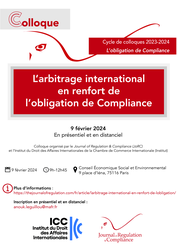
🌐follow Marie-Anne Frison-Roche on LinkedIn
🌐subscribe to the Newsletter MAFR Regulation, Compliance, Law
____
► Full Reference: M.-A. Frison-Roche, "Le renforcement des engagements de Compliance par le renvoi Ex Ante à l'arbitrage international" ("Reinforcing Compliance commitments by referring Ex Ante to International Arbitration"), in L. Aynès, M.-A. Frison-Roche, J.-B. Racine and E. Silva-Romero (dir.), L'arbitrage international en renfort de l'obligation de Compliance (International Arbitration in support of the Compliance Obligation), Journal of Regulation & Compliance (JoRC) and Institute of World Business Law of the ICC (Institute), Conseil Économique Social et Environnemental (CESE), Paris, February 9, 2024
____
🧮see the full programme of this event
____
🌐consult on LinkedIn a general presentation of this event, which links to a presentation of each speech (in French)
____
____
🔲see the slides used to support the presentation (in French)
____
📝This conference and the Working Paper on which it is based are to be linked with the article to be published in the book📘Compliance Obligation
____
🎤see a presentation of the conference "Préalable : ce qu'est l'Obligation de Compliance" ("Prerequisite: what is the Compliance Obligation"), given at the same symposium
____
🎤see a presentation of the conference "Préalable : ce qu'est un engagement" ("Prerequisite: the Commitment"), given at the same symposium
____
► Presentation of the conference: It was initially planned that I would speak on the subject Le renforcement des engagements de Compliance par le renvoi Ex Ante à l'arbitrage international (Reinforcing Compliance commitments through the Ex Ante referral to International Arbitration), but it was agreed with the other organisers of the symposium that after defining the concept of the Compliance Obligation📎
- The inclusion of an offer of arbitration in the field of Compliance implies considering it in a contract as well as in a non-contractual commitment, and studying which category of Compliance Obligation the offer may apply to.
- This insertion benefits from taking the form of a "graduated offer", in a crescendo organised by the company ex ante and offered to the stakeholders: conciliation, mediation and arbitration, in "circles of trust"📎
!footnote-3387 . This is supported by the current French amicable settlement policy. - The result was that I had to prepare a long "preliminary" discussion of what a "commitment" is, without which it seemed difficult to talk in concrete terms about the effective insertion of an offer of arbitration if we did not know whether such links or words had a constraining effect on the person issuing them in relation to the person benefiting from them. After discussions with the other speakers, it became clear that it would be more effective to give a talk devoted solely to the question of the legal definition of commitment. We therefore decided to allocate this second speaking slot to the notion of commitment. Since the written words do not have the same constraints, it will take up the initial construction, insisting on the different supports, either compliance contracts, or associations with compliance clauses, relating to different Compliance obligations, in particular on information or audit or Vigilance📎
!footnote-3388 , because the company must have the legal power corresponding to the mission that the State entrusts to it through Compliance📎!footnote-3389 . - The offer must be carefully drafted to explain its purpose, and its organisation must prove the reality of this purpose: to give access to a judge to people affected by the company's activity, and not to block it.
- This will therefore be available in detail in the forthcoming books:
- M.-A. Frison-Roche (ed.), 📕L'obligation de Compliance
- M.-A. Frison-Roche (ed.), 📘Compliance Obligation
________
🕴️M.-A. Frison-Roche, 🎤Préalable : ce qu'est l'obligation de Compliance (Prerequisite: the Compliance Obligation), in 🧮L'arbitrage international en renfort de l'obligation de Compliance (International Arbitration in support of the Compliance Obligation), 2024.
M.-A. Frison-Roche, Préalable : ce qu'est un engagement
🕴️M.-A. Frison-Roche, 🎤Préalable : ce qu'est un engagement (Prerequisite: the Commitment), in 🧮L'arbitrage international en renfort de l'obligation de Compliance (International Arbitration in support of the Compliance Obligation), 2024.
🕴️M.-A. Frison-Roche, 🚧Compliance and Trust, 2017.
🕴️M.-A. Frison-Roche, 🚧Conceiving Power, 2021.

Jan. 22, 2024
Public Auditions

🌐suivre Marie-Anne Frison-Roche sur LinkedIn
🌐s'abonner à la Newsletter MAFR Regulation, Compliance, Law
____
► Référence complète : M.-A. Frison-Roche, audition notamment par Maître Sophie Bonne et Maître Anne-Claire Ancelin, respectivement présidente et rapporteure de la Commission du Conseil Supérieur du Notariat (CSN), élaborant un rapport sur Compliance : un espace à conquérir ?, 22 janvier 2024, CSN, Paris..
____
► Résumé de la présentation : j'ai eu l'occasion d'étudier et de discuter des relations entre le notaire comme professionnel et le notariat comme structure de régulation d'une part et le Droit de la Compliance, d'autre part.
Je l'ai fait lors des travaux du Conseil Supérieur du Notariat sur la raison d'être, dans une audition avec la Commission du CSN en charge de la réflexion à ce propos et et d'une façon plus générale à propos de l'articulation entre l'office du notariat et les mécanismes juridiques de régulation, car le Droit de la Compliance est le prolongement du Droit de la Régulation. J'ai d'ailleurs à ce titre fait une masterclass sur le droit de la compliance lors du Congrès annuel de 2022 à ce sujet.
M'appuyant sur ces premières réflexions et discussions, je peux articuler les propos suivants:
0. Observation préalable : l'intitulé semble sous-entendre que la compliance serait un espace nouveau, où le notariat serait étranger et qu'il faudrait "conquérir" cette terra incognita , le point d'interrogation permettant de suggérer que, si nouveau soit le Droit de la Compliance, c'est plutôt dans les professions agissant en Ex Ante qu'il est le moins "étranger" et que l'espace est donc déjà le plus "naturel".
L'enjeu est plutôt dans l'ambition que l'on peut en avoir : soit une ambition faible ("conformité"), soit une ambition forte ("Droit de la Compliance").
1. Un espace restreint aujourd'hui et plus encore demain si l'on réduit la Compliance à ce qui n'est que son outil : la conformité. Cette réduction équivaut à un grand dommage, car les algorithmes sont aptes à prendre en charge la conformité, et font le faire le plus en plus, tandis que la compliance est maniée par les êtres humains. La conformité est, mais n'est que, un outil de la Compliance.
2. La Compliance se définit par les Buts Monumentaux
- Les Buts monumentaux sont fixés par les Autorités politiques et publiques et ne peuvent être fixés que par elles ; le déploiement des moyens peuvent être déploient par d'autres que l'administration
3. Pragmatiquement, les buts monumentaux unifient la "masse réglementaire"
4. Tendre, dans une trajectoire, vers eux nécessite des êtres humains qui se coordonnent et agissent ensemble (ensemble du modèle concurrentiel)
5. Ils constituent la Compliance comme une branche ex ante du Droit
6. Ils placent le Droit de la Compliance en déploiement du Droit de la Régulation
7. Le Notariat est alors tout d'abord un "agent d'effectivité de la conformité", se dotant pour cela notamment des outils algorithmiques
8. Le Notariat est aussi une profession humaniste qui aide l'Etat, les entreprises et les parties intéressées à tendre vers la protection des êtres humains, pour qu'ils ne soient pas broyés par les systèmes devenus plus menaçants (but monumental négatif) et qu'ils en bénéficient (but monumental positif)
9. En cela, le Notariat, comme le Juge et l'Avocat, doit être consolidé dans sa structure, et doit aussi se présenter, au niveau du professionnel, au niveau de l'étude, au niveau de la profession structurée
10. Le Notariat doit aussi conforter sa gouvernance dans ce nouveau système de Compliance qui est en lien avec l'Etat de Droit et la Démocratie.
____
► Voir dans mes travaux ceux qui peuvent présenter un intérêt au regard de cette audition ⤵️
🕴️M.-A. Frison-Roche, 🖥️Appliquer la notion de "Raison d'être à la profession du Notariat, 2021
🕴️M.-A. Frison-Roche,🎤La compliance pour les études notariales : aspects théoriques et pratiques, Congrès des notaires , 2022
🕴️M.-A. Frison-Roche,📝Notariat et régulation font bon ménage, 2015
🕴️M.-A. Frison-Roche, 💬La profession investit le Droit de la Compliance et détermine sa Raison d'Etre, 2023
🕴️M.-A. Frison-Roche (dir.), 📕Les Buts Monumentaux de la Compliance, 2022
🕴️M.-A. Frison-Roche, 📝Penser et manier la Vigilance par ses Buts Monumentaux de Compliance, mars 2023.
🕴️M.-A. Frison-Roche, 📝Contrat de compliance, clauses de compliance, 2022.
🕴️M.-A. Frison-Roche, 🚧L'invention de la vigilance : un terme nouveau pour une Responsabilité en Ex Ante, 2021.
🕴️M.-A. Frison-Roche, 📝Synthèse : Le rôle du juge dans le déploiement du droit de la régulation par le droit de la compliance, à paraître
🕴️M.-A. Frison-Roche, 📝Le Droit de la compliance, 2016.
________

Jan. 12, 2024
Publications
► Référence complète : M.-A. Frison-Roche, notes prises pour faire le rapport de synthèse du colloque Compliance et Contrats, 12 janvier 2024
____
🧮lire la présentation de la conférence
____
► Méthode : La conclusion a été conçue comme une synthèse des propos qui se sont succédés dans la journée.
Elle nourrira également la contribution à l'ouvrage Compliance et Contrat : "Le contrat public, modèle du contrat de compliance".
Parce qu'il s'agit d'une synthèse, le document ne s'appuie que sur les propos tenus et n'est pas doté de références techniques, ne renvoyant pas non plus à des travaux personnels, même si le lien entre le Droit de la Régulation et le Droit de la Compliance, qu'illustre particulièrement les contrats publics, a fait l'objet de nombreux écrits depuis des années.
____
🔓lire les notes prises au fur et à mesure de l'écoute des différentes interventions des orateurs successifs ⤵️

April 25, 2023
Publications

🌐follow Marie-Anne Frison-Roche on LinkedIn
🌐subscribe to the Newsletter MAFR Regulation, Compliance, Law
____
 ► Full Reference: M.-A. Frison-Roche, The role of the Judge in the deployment of Regulatory Law through Compliance Law, Working Paper, April 2023.
► Full Reference: M.-A. Frison-Roche, The role of the Judge in the deployment of Regulatory Law through Compliance Law, Working Paper, April 2023.
____
🎤 This working paper was drawn up to serve as the basis for the concluding summary session of the colloquium organised by the Conseil d'Etat (French Administrative Supreme Court) and the Cour de cassation (French Judicial Supreme Court), De la régulation à la compliance: quel rôle pour le juge? ("From Regulation to Compliance: what role for the Judge?") held on 2 June 2023 at the Conseil d'Etat.
____
📝 This working paper also served as the basis for the article that concludes the book De la régulation à la compliance : quel rôle pour le juge, published by the La Documentation Française, 2024.
____
► Working Paper Summary: It is remarkable to note the unity of conception and practice between professionals who tend to work in administrative jurisdictions and professionals who tend to work in judicial jurisdictions: they all note, in similar terms, an essential movement: what Regulatory Law is, how it has been transformed into Compliance Law, and how in one and even more so in the other the Judge is at the centre of it. Judges, as well as regulators and European officials, explain this and use different examples to illustrate the profound transformation this has brought about for the law and for the companies responsible for increasing the systemic effectiveness of the rules through the practice and dissemination of a culture of compliance. The role of the judge participating in this Ex Ante transformation is renewed, whether he is a public law judge or a private law judge, in a greater unity of the legal system.
____
🔓read the Working Paper below⤵️
April 18, 2023
Newsletter MAFR - Law, Compliance, Regulation

♾️ follow Marie-Anne Frison-Roche on LinkedIn
♾️ subscribe to the Newsletter MAFR Regulation, Compliance, Law
____
► Full Reference: M.-A. Frison-Roche, "Pour un consommateur "vigilant" : l'éduquer. Analyse juridique" ("For a "vigilant" consumer: educate him. Legal analysis"), Newsletter MAFR - Law, Compliance, Regulation, 18 April 2023.
____
📧Read by freely subscribing other news of the Newsletter MAFR - Law, Compliance, Regulation
____
🔴For an efficient Compliance Law: an Ex Ante responsibility in alliance with consumer expectations
A survey confirms that consumers integrate the monumental goals that generate compliance duties and obligations on the companies that sell them products. But this does not create a duty on them to prefer these products over others: they do not feel "responsible" for them. Compliance Law is based on ex ante responsibility and shared duty. So, faced with this attitude, what can the Law do?
____
📧read the article ⤵️
March 15, 2023
Thesaurus : Doctrine
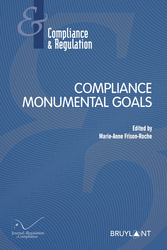
► Full Reference: A. Mendoza-Caminade, "Proportionality and Evaluation. The Example of Intellectual Property Law", in M.-A. Frison-Roche (ed.), Compliance Monumental Goals, coll. "Compliance & Regulation", Journal of Regulation & Compliance (JoRC) and Bruylant, 2023, p. 221-236.
____
📘read a general presentation of the book, Compliance Monumental Goals, in which this article is published.
____
► Summary of the article:
________
Feb. 2, 2023
Thesaurus : Doctrine

► Full Reference: A. Bruneau, "L'entreprise juge d'elle-même : la fonction compliance dans la banque" ("The company judge of itself: the compliance function inside the bank"), in M.-A. Frison-Roche (ed.), La juridictionnalisation de la Compliance, coll. "Régulations & Compliance", Journal of Regulation & Compliance (JoRC) and Dalloz, 2023, p. 115-131.
____
📕read a general presentation of the book, La juridictionnalisation de la Compliance, in which this article is published
____
► Summary of the article (done by the author): First of all, it should be remembered that the compliance function was born within finance, and that by being structured, it has evolved to support the transition from regulatory law to compliance law. Through these changes, compliance has gone from an ex-post controlling function to an ex-ante binding function. The LIBOR crisis imperfectly illustrates the primacy of this transition. The evolution of this role is illustrated by concrete examples
Firstly, the management of reputational risk is a fundamental part of the company as prosecutor and judge of itself. Reputational risk is a significant element for a financial institution, because it can have negative consequences on its capitalization, or even culminate in a systemic crisis. Avoiding a large-scale financial crisis is also part of the monumental goals of compliance.
In order to avoid complex and inopportune scenarios, compliance law intervenes as early as possible and identifies issues that may impact reputation. The regulations require the implementation of certain ex ante mechanisms. The French law known as "Sapin 2" requires the implementation of tools that concern all companies (and not just banks). Indeed, beyond the risk of reputation, it is essential to consider the risk of corruption. Consideration of reputational risk may justify refusing to execute certain transactions. From this perspective, compliance must assess the potential consequences of entering into a relationship with a new client upstream, sometimes to decline the provision of services. The compliance function therefore unilaterally judges the relationship with a view to managing the company reputational risk.
Secondly, the internal sanction mechanism established by compliance law is also discussed in this article, in particular the internal sanctions adopted by compliance in a financial institution.
Compliance can act as a prosecutor via management committees set up within the business lines. In addition, compliance can determine and apply sanctions against employees. In this way, there is a dual role of prosecutor and judge for the compliance function within the framework of an extraordinary mechanism of ordinary law.
Finally, the analysis deals with the case of the "judge-judged": following a decision by the bank, the regulator may take an even stricter position by believing that the bank is applying its guidelines incorrectly. Thus, the compliance law, which takes hold within the banking enterprise, finds itself under the judgment of its own regulator. The company finds itself judged and comes to be a prosecutor and judge of itself, but also of its clients.
__________
Feb. 2, 2023
Thesaurus : Doctrine

► Full Reference: O. Douvreleur, "Compliance et juge du droit" ("Compliance and Judge ruling only on points of Law"), in M.-A. Frison-Roche (ed.), La juridictionnalisation de la Compliance, coll. "Régulations & Compliance", Journal of Regulation & Compliance (JoRC) and Dalloz, 2023, p. 465-471.
____
📕read a general presentation of the book, La juridictionnalisation de la Compliance, in which this article is published
____
► Summary of the article (done by the Journal of Regulation & Compliance): Compliance maintains with the judge complex relations, and even more with the judge ruling only on points of Law (in France, the Court de Cassation in the judicial order, the one who, in principle, does not know the facts that he leaves to the sovereign appreciation of the judges ruling on the substance of the disputes. At first glance, compliance is a technique internalised in companies and the place occupied by negotiated justice techniques leave little room for intervention by the judge ruling only on points of Law
However, his role is intended to develop, in particular with regard to the duty of vigilance or in the articulation between the different branches of Law when compliance meets Labor Law, or even in the adjustment between American Law and the other legal systems, especially French legal system. The way in which the principle of Proportionality will take place in Compliance Law is also a major issue for the judge ruling only on points of Law.
________
Feb. 1, 2023
Compliance: at the moment

♾️ suivre Marie-Anne Frison-Roche sur LinkedIn
♾️ s'abonner à la Newsletter MAFR Regulation, Compliance, Law
____
► Référence complète : M.-A. Frison-Roche, "Face à des professions régulées, l'Autorité de la concurrence se comporte en Régulateur", Newsletter MAFR Law, Compliance, Regulation, 1ier février 2023.
____
L'Autorité de la concurrence publie le 1ier février 2023 deux consultations publiques jumelées, relatives à la Liberté d'installation des notaires et des commissaires de justice.
Chacun a jusqu'au 22 mars 2023 pour y contribuer.
Ce faisant, l'Autorité se place dans une perspective de régulation car elle articule l'usage de ce pouvoir général de consultation - préalable à un avis à propos de l'installation de nouvelles études, en s'appuyant notamment sur les contributions, avec un pouvoir spécifique et direct que lui a donné la Loi : celui de superviser la carte de ces nouvelles ouvertures.
S'il ne s'agissait d'exercer ce dernier pouvoir que dans la perspective concurrentielle, il ne serait pas pertinent d'articuler cela à un avis et une consultation globale sur la politique générale du maillage territorial par lequel notaires et commissaires de justice exercent leurs activités.
La perspective de régulation, qui embrasse davantage et établit des équilibres à long terme entre la concurrence et d'autres soucis, est affirmée par l'Autorité de concurrence.
Cette perspective adoptée par l'Autorité est légitime, dès l'instant que la loi le lui permet, lui offrant tous les instruments pour le faire, et que les entreprises et/ou les activités dont il s'agit sont elles-mêmes régulées. C'est le cas lorsque les entreprises appartiennent à ce que l'on appelle souvent des "professions réglementées", la réglementation étant l'indice le plus certain de la régulation Ex Ante.
C'est même reconnaître leur nature que de le faire, ne pas les briser en ne leur appliquant que la pure et simple "loi de la concurrence".
Le Législateur permet à l'Autorité de le faire puisque, comme elle le rappelle dans son Communiqué, la loi dite Macron de 2015 lui a donné mission de contrôler le maillage d'ouverture sur le territoire concernant les notaires et ceux qui sont aujourd'hui les commissaires de justice. C'est l'Autorité qui formule les propositions d'ouverture, la carte devant être revue tous les 2 ans.
L'on avait à l'époque beaucoup considéré que la seule perspective était celle de la concurrence, qu'il ne s'agissait que de laisser le mécanisme concurrence entrer dans ces activités, quoi qu'il en résulte et que l'Autorité allait être chargée de cela, alors que le texte présentait déjà une perspective de régulation.
🔴 M.-A. Frison-Roche, 📝Notariat et Régulation font bon ménage, 2015
L'Autorité accroît cette perspective de régulation, c'est-à-dire de construction et de maintien d'équilibres à long terme, rappelant la pratique qu'elle a eue, qu'elle qualifie de "prudente", intégrant notamment les difficultés de la crise sanitaire et le souci du long terme.
Par le biais des consultations pour former des recommandations adéquates, parce que la consultation est un pouvoir général, celle-ci peut dépasser l'objet plutôt restrictif de la loi qui se soucie de l'équilibre territorial. Qu'on en juge, puisque les contributeurs sont invités à réfléchir dans la perspective suivante: "Outre les thèmes récurrents des consultations publiques (l’évaluation de la procédure de nomination, l’impact des créations d’offices sur les différentes parties prenantes ou la cohésion territoriale des prestations), l’Autorité a identifié plusieurs enjeux importants sur lesquels les acteurs intéressés sont invités à formuler des observations, dont notamment :
- les conséquences de la crise sanitaire sur le volume d’activité et l’organisation des offices ;
- les risques pesant sur l’activité des professionnels du fait de la dégradation de la conjoncture économique (ralentissement de la croissance, hausse de l’inflation, durcissement des conditions d’octroi de crédits immobiliers,…) ;
- l’impact de la réforme de la discipline et de la déontologie des professions du droit ;
- les implications de la fusion des professions d'huissier de justice et de commissaire-priseur judiciaire en une profession unique de commissaire de justice depuis juillet 2022".
Ainsi, plutôt que de ne regarder que l'aspect concurrentiel dans ce qui n'est qu'une recommandation, laissant au Gouvernement le soin d'intégrer le reste dans ses propres décisions, notamment parce qu'il mène par ailleurs ses réformes (fusion des professions, réformes de la discipline et déontologie), l'Autorité intègre l'ensemble dès son intervention.
Le président de l'Autorité, Benoît Cœuré, a d'ailleurs développé cette conception lors du premier colloque des Commissaires de justice le 8 décembre 2022.
L'Autorité a raison de le faire, car on connait le poids de ses "recommandations" dont l'encre est déjà le plus souvent celle des arrêtés ministériels en fin de process.
En ouvrant à chacun la possibilité d'exprimer sa conception sur ce qui doit être un maillage territorial adéquat, et au-delà un déploiement adéquat de ces professions, l'Autorité de la concurrence participe plus directement à la régulation de ces professions, qui sont des entreprises dont la mission spécifique implique à la fois des obligations (la discipline et la déontologie, par exemple), une supervision et des règles plus complexes que la libre rencontre de l'offre et de la demande.
Si une Autorité de concurrence n'est pas légitime à se transformer en Autorité de régulation concernant des activités économiques qui sont ordinaires, car la régulation, notamment en ce qu'elle est ex ante et implique des mécanismes de compliance sur les entreprises concernées, en revanche si les entreprises, ici les officiers publics ou les professions libérales, comme les avocats, les médecins ou les pharmaciens, sont elles-mêmes régulées, l'Autorité de concurrence reconnaît leur nature en s'associant à la supervision exercée par les Autorités publiques (dans le cas présent, par le Ministère de la justice).
En outre et en cela, l'Autorité de concurrence s'articule avec les structures professionnelles que sont les Ordres, à travers la notion de "mission".
🔴 M.-A. Frison-Roche, 🎤La compliance dans l'entreprise notariale : aspects théoriques et pratiques, 2022
🔴 M.-A. Frison-Roche, 🎥La compliance, perspective dynamique pour exprimer la raison d'être des commissaires de justice, 2022
🔴 M.-A. Frison-Roche, 🎥Régulation et Compliance, expression des missions d'un Ordre, 2022
________
March 31, 2022
Publications

♾️ follow Marie-Anne Frison-Roche on LinkedIn
♾️ subscribe to the Newsletter MAFR Regulation, Compliance, Law
____
► Full Reference: FM.-A. Frison-Roche, La responsabilité ex ante, pilier du droit de la compliance ("Ex-Ante Responsibility, Compliance Law Pillar"), D.2022, chronique MAFR - Droit de la Compliance, Recueil Dalloz, March 31, 2022.
____
► Article English Summary: The Law must help to face the future, which can be totally catastrophic in terms of climate and digital issues. Courts are s best placed for this, without “governing”, only relying on the commitments made by companies, governments, and legislators. On the ordinary Tort Law, court decisions oblige these different entities to be consistent in the commitments they have made, obliging them to act in the future, formal “compliance” with the regulations cannot be sufficient. This ex-ante responsibility, founding the powers, thus constitutes a pillar of a substantial Compliance Law, showing the part that CSR and the companies with a raison d'être play in it.
____
📝 read the article. (written in French)
____
📚go to the presentation of the other articles published in this Chronique Droit de la Compliance made in the Recueil Dalloz.
________
March 17, 2022
Publications
🌐follow Marie-Anne Frison-Roche on LinkedIn
🌐subscribe to the Newsletter MAFR Regulation, Compliance, Law
____
► Full Reference: M.-A. Frison-Roche, "La responsabilité Ex Ante" ("Ex Ante Responsibility"), in Archives de Philosophie du Droit (APD), La responsabilité, t. 63, Dalloz, 2022, pp. 105-115
____
📝read the article (in French)
____
🚧read the bilingual Working Paper which is the basis of this article, with additional developments, technical references and hyperlinks
____
► English Summary of the article:
________
March 8, 2022
Public Auditions

🌐suivre Marie-Anne Frison-Roche sur LinkedIn
🌐s'abonner à la Newsletter MAFR Regulation, Compliance, Law
____
► Référence complète : M.-A. Frison-Roche, audition par la Commission des Lois du Sénat sur la Proposition de Loi constitutionnelle relative à l'interruption volontaire de grossesse et à la contraception, 27 septembre 2022.
►Référence complète : M.-A. Frison-Roche, Audition par la Section du Rapport et des Etudes du Conseil d'Etat pour la préparation du Rapport annuel sur Les réseaux sociaux, Conseil d'Etat, 8 mars 2022.
____
►Résumé de la présentation faite avant la discussion : Pour la partie reproductible de cette audition, consistant dans la présentation qui a pu être faite de la relation entre le Droit de la Compliance et le phénomène des réseaux sociaux, il a été repris l'idée générale d'un impératif de "réguler un espace sans ancrage" et l'apport que représente pour cela le Droit de la Compliance, dès l'instant qu'il n'est pas défini comme le fait de "se conformer" à l'ensemble de la réglementation applicable à l'agent mais comme la charge d'atteindre des "Buts Monumentaux", négatifs ou/et positifs, l'opérateurs ainsi chargé de cette obligation de moyens parce qu'il est en position de le faire, devant avoir la puissance pour y parvenir.
Se dégagent alors des notions nouvelles, comme la "Responsabilité Ex Ante" ou une notion de "Pouvoir" qui est commune aux opérateurs de droit privé et de droit public, leur nationalité venant également en second plan, le Droit de la Compliance étant naturellement a-territorial.
Cette définition substantielle du Droit de la Compliance qui met en première ligne les opérateurs requiert que ceux-ci soient supervisé (dans un continuum entre Régulation, Supervision, Compliance,) le Droit de la Compliance opérant un continuum du Droit de la Régulation en n'étant plus lié avec l'impératif d'un secteur. Les opérateurs cruciaux numériques sont ainsi "responsabilisés", grâce à une "responsabilité Ex Ante", et s'ils sont supervisés par des Autorités de supervision (dont le modèle historique est le superviseur bancaire, ici l'Arcom), c'est le juge qui a fait naitre cette nouvelle notion de "responsabilité Ex Ante, pilier du Droit de la Compliance, aujourd'hui délivré du territoire dans une jurisprudence à propos du Climat qu'il convient de concevoir plus largement.
Ainsi délivré du secteur et du territoire, le Droit de la Compliance peut affronter le mal des réseaux sociaux que sont la désinformation et l'atteinte des enfants, maux systémiques où peut se perdre la Démocratie, perspective face à laquelle l'Ex Post est inapproprié.
Le Droit de la Compliance est donc pleinement adéquat.
Il convient que le Juge continue sa mue en concevant lui-même non pas seulement dans un Ex Post plus rapide, mais dans un office Ex Ante, contrôlant des entreprises qui, elles-mêmes doivent avoir des fonctions des offices de gardiens (ici gardiens des limites concernant les contenus).
______
Voir ⤵️ la structure plus formelle de l'intervention, qui fut ensuite discutée
Oct. 10, 2021
Compliance: at the moment

Sept. 15, 2021
Publications

 ► Full Reference: Frison-Roche, M.-A., Ex Ante Responsibility, Working Paper, December 2021.
► Full Reference: Frison-Roche, M.-A., Ex Ante Responsibility, Working Paper, December 2021.
____
📝This Working Paper has been the basis for an article written in French in the Archives de Philosophie du droit (APD), in the book La Responsabilité (2022).
____
► Working Paper Summary: Quel est le temps auquel s'articule la responsabilité ? La question est si classique que toutes les réponses ont été dessinées : si l'on est responsable plus aisément par rapport au temps, car l'on peut alors plus aisément faire un lien entre la situation appréhendée, sa réalisation dans le passé la rendant plus facilement connaissable, et le poids de "responsabilité" que l'on impute sur une personne, l'on peut articuler la responsabilité avec le futur. Si l'on brise le poids de cette responsabilité avec un évènement ou une situation, par exemple. Le Principe Responsabilité de Jonas ou l'Ethique de la Responsabilité font ainsi voyager la Responsabilité dans le temps, par un rapport entre le Droit et l'Ethique.
D'ailleurs l'on pourrait soutenir que le Droit peut faire ce qu'il veut et imputer une responsabilité à quiconque pour le temps qu'il désigne, par exemple désigne comme porteur d'une responsabilité, c'est-à-dire d'un poids, celui qu'il veut. Le "responsable" serait alors le titulaire d'une sorte de "poids pur", qui le charge parce que le Droit l'a voulu pour le temps qu'il veut, par exemple un devoir d'agir pour que le futur soit dessiné comme le veut le Droit, alors même que le Responsable n'a rien à se reprocher dans le passé.
Mais les Cours constitutionnelle défendent un rapport minimal entre la Responsabilité et le poids que celle-ci fait porter une personne, fut-t-elle morale, gardant ainsi le lien consubstantiel entre le Droit et la Morale, la technique juridique de la Responsabilité ne pouvant équivaloir à celle d'un prélèvement obligatoire.
Ainsi l'idée d'une Responsabilité Ex Ante est simple dans son principe (I). Elle est celle d'un poids juridiquement posé sur une personne soit par elle-même (engagement), soit par la Loi ou par le Juge sur une personne de faire quelque chose pour que n'advienne pas quelque chose qui adviendrait ou pour qu'advienne quelque chose qui n'adviendrait pas si elle ne le faisait pas.
Mais les conditions juridiques pour admettre un tel poids alors même que le lien avec une situation passée serait brisé est plus difficile (II). On continue certes continuer à voir dans le futur le passé, ce qui facilite le voyage dans le temps, et fonda par exemple le contrôle Ex Ante du contrôle des concentrations. Mais l'on peut se briser même de cette facilité et regarder non plus le rapport entre le passé et le futur, mais le présent et le futur : ce que l'on sait déjà aujourd'hui du futur, ce qui met en jeu le rapport entre le Droit et la Science ; ce que l'on observe de l'emprise de la personne présente sur le moment présent, c'est-à-dire le Pouvoir, ce qui fait en jeu le rapport entre le Droit et l'Economie politique.
Dans cette dimension-là, la contrainte de la Responsabilité Ex Ante est alors maniée par le Juge, dont l'office lui-même devient un office Ex Ante. Les pouvoirs obligés Ex Ante par une telle responsabilité maniée par le Juge étaient les personnes en situation de pouvoir, sont non seulement les entreprises, mais encore les Etats, qui perdent le privilège - partagé avec les contractants - de disposer juridiquement du futur, et notamment en leur sein le Législateur.
Une telle révolution, qui se déroule sous nos yeux, s'explique parce qu'il faut agir maintenant pour que le futur ne soit pas catastrophique. La science nous informe qu'il le sera entéléchiquement. Il est donc juridiquement requis de désigner des responsables, non pas parce qu'ils auraient fait quelque chose, la dimension Ex Post n'étant pas le sujet, mais pour qu'ils fassent quelque chose, la Responsabilité Ex Ante étant un élément central de cette nouvelle branche du Droit qu'est le Droit de la Compliance.
May 17, 2021
Conferences
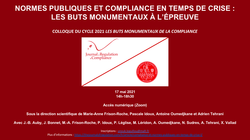
 Référence complète: Frison-Roche, M.-A., La place des entreprises dans la création et l'effectivité du Droit de la Compliance en cas de crise in (dir.) Les normes publiques et la Compliance en temps de crise : les buts monumentaux à l'épreuve, colloque coorganisé par le Journal of Regulation & Compliance (JoRC) et la Faculté de droit de Montpellier, 17 mai 2021.
Référence complète: Frison-Roche, M.-A., La place des entreprises dans la création et l'effectivité du Droit de la Compliance en cas de crise in (dir.) Les normes publiques et la Compliance en temps de crise : les buts monumentaux à l'épreuve, colloque coorganisé par le Journal of Regulation & Compliance (JoRC) et la Faculté de droit de Montpellier, 17 mai 2021.
Consulter les slides sur lesquelles s'appuie cette conférence.
Regarder la vidéo de cette conférence.
Lire le programme général de ce colloque
Lire le document de travail sur la base duquel la conférence a été élaborée.
___
Ce colloque s'insère dans le cycle de colloques 2021 organisé par le Journal of Regulation & Compliance (JoRC) et ses partenaires autour des Buts monumentaux de la Compliance.
Les interventions serviront de première base à la réalisation d'un ouvrage dirigé par Marie-Anne Frison-Roche, dont la version française, Les Buts monumentaux de la Compliance, est co-éditée par le JoRC et Dalloz et dont la version anglaise, Compliance Monumental Goals, est co-éditée par le JoRC et Bruylant.
____
Résumé de la conférence : Il s'agit d'observer la façon dont les entreprises agissent lorsque la crise advient et l'impact produit sur les "Buts Monumentaux de la Compliance". Il apparaît que les entreprises ont aidé, soit sur l'ordre des Autorités publiques, soit de leur propre initiative. Toute "épreuve" étant une "preuve", la leçon à tirer de la preuve sanitaire est à retirer face à la crise environnementale dont nous sommes déjà informés.
La crise montre la place et le rôle des entreprises pour que tout d'abord survive l'effectivité du Droit de la Compliance par le souci maintenu de ses buts, grâce à l'aide requise ou spontanée des entreprises.
Mais plus encore l'on a pu observer des entreprises actives en raison de leur "position" pour des buts qui n'étaient pas les leurs, comme l'environnement. L'on retrouve alors la définition générale du Droit de la Compliance comme l'alliance en Ex Ante entre Autorités publiques et opérateurs privés cruciaux, pour maîtriser le futur. Ce sont les juges qui les assignent à cette alliance, ici et maintenant. La crise sanitaire en accélère la construction.
April 21, 2021
Thesaurus : Doctrine
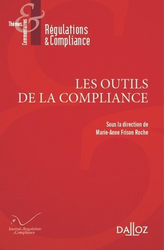
► Full Reference : Th. Amico, "La Compliance ou le passage de l'ex post à l'ex ante. Une révolution copernicienne pour l'avocat pénaliste ?" ("Compliance or the passage from ex post to ex ante: a Compernican revolution for the criminal lawyer?"), in M.-A. Frison-Roche (ed.), Les outils de la Compliance, coll. "Régulations & Compliance", Journal of Regulation & Compliance (JoRC) and Dalloz, 2021, p. 145-154.
____
📕read a general presentation of the book, Les outils de la Compliance, in which this article is published
____
► Summary of the article (done by the Journal of Regulation & Compliance): After referring to various definitions of Compliance Law, the author insists on the usefulness of the criminal lawyer in that he, familiar with the Ex-Post that constitutes the sanction, can be of good advice. in the Ex-Ante in which new compliance mechanisms are being developed, such as risk mapping or third-party assessment.
Addressing the punitive dimension of Compliance Law, the author shows that the criminal lawyer therefore naturally has a place there, whether it concerns the powers exercised by an administrative authority or the criminal law itself. In that he can "anticipate criminal proceedings", the criminal lawyer is therefore best able to ensure that the company does not expose itself to them, in particular in a good mastery of internal investigations, thus ruling out the criminal risk.
________
March 26, 2021
Thesaurus : Soft Law
Référence complète : Haut Commissariat au Plan : Electricité : le devoir de lucidité , note du 26 mars 2021.